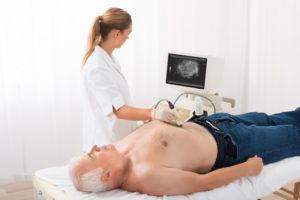Testing device spotlight: abdominal aortic duplex
 CVAM is fully equipped with some of the most advanced diagnostic tools on the market today. We want to help our patients better understand the tests that they may go through when coming into our practice for cardiovascular care. Our cardiologists are excited to educate patients on certain diagnostic tests performed in our office, including abdominal aortic duplex.
CVAM is fully equipped with some of the most advanced diagnostic tools on the market today. We want to help our patients better understand the tests that they may go through when coming into our practice for cardiovascular care. Our cardiologists are excited to educate patients on certain diagnostic tests performed in our office, including abdominal aortic duplex.
What is an abdominal aortic duplex?
This device is a specialized instruments that provides doctors the opportunity to evaluate the aorta in the abdomen using ultrasound which emits high frequency sound waves for diagnostic purposes. This device may also be used by the doctor to evaluate other arteries in the body that deliver blood to the other major organs. The abdominal aortic duplex allows doctors to see:
- The flow of blood through the legs to look for blockages
- Plaque that can develop on the arterial wall and narrow the arteries
- Aneurysms (bulging arteries)
- The effectiveness of previous surgeries and treatments such as bypass grafts and stents
Is the abdominal aortic duplex testing painful?
This procedure is done on the abdomen. The doctor will have the patient remove outer clothing on the upper half of the body after discussing their symptoms. The office is dimmed to allow for evaluation of the ultrasound images. A gel is administered onto the abdomen and the transducer, a small handheld device, is moved around on the abdomen with light pressure to see images of the vessel walls and arteries. This pressure does not cause any pain, and patients are comfortable during this diagnostic testing.
How do I prepare for abdominal aortic duplex diagnostics?
Patients should arrive at the practice with loose-fitted clothing that can be easily removed. Patients should not eat or drink for approximately four hours before their test, nor should they smoke, chew gum, or eat candy. Most patients are told to avoid any medications that morning before diagnostics, and should avoid wearing body lotions, perfumes, or powders on the body.
Discover the diagnostic tests right for you during an appointment at CVAM
Mesa, AZ area patients are welcome to request an appointment at CVAM by calling (480) 641-5400 and visiting the office at 6116 East Arbor Avenue. Our cardiologists provide top-notch cardiovascular care, and use some of the latest technologies to provide proper diagnostics of common heart concerns.
